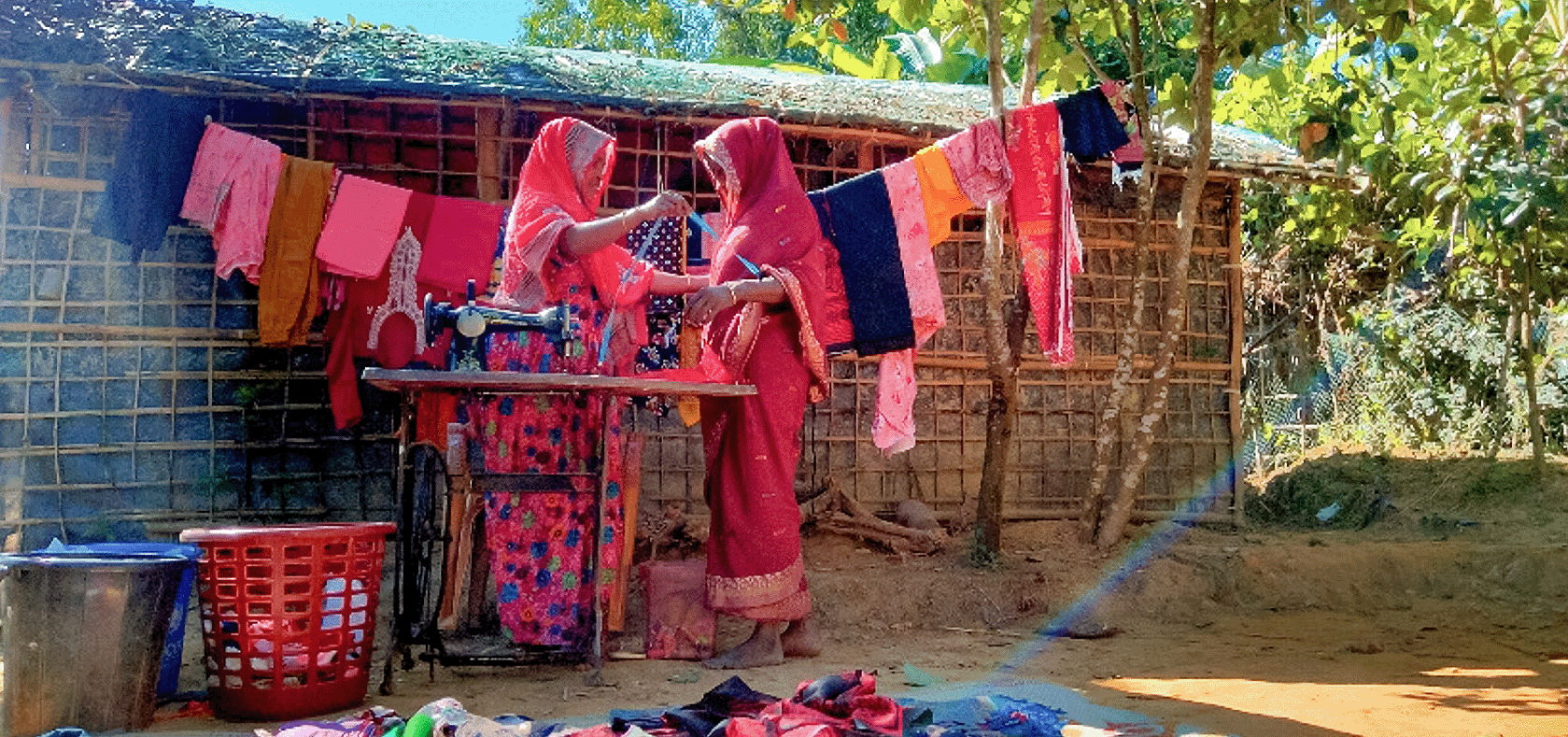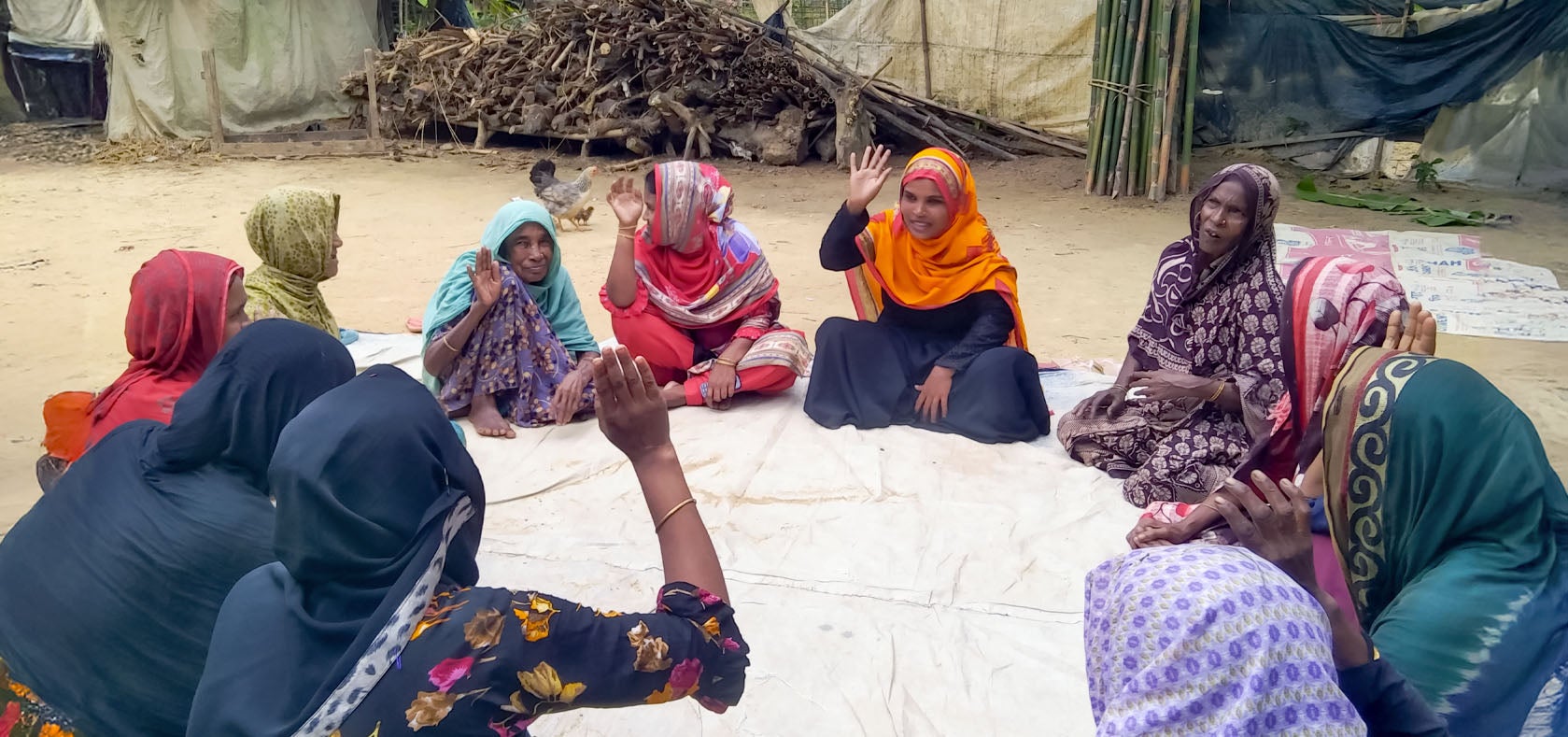Breaking Barriers: A woman homemaker’s inspiring path to business ownership in Cox’s Bazar
Date:
Author: Magfuzur Rahman Shana

The Cox’s Bazar refugee camp has benefited from economic growth and has relatively low poverty rates compared to the rest of Bangladesh, but ‘pockets’ with high poverty exist in the sub-districts surrounding refugee camps, such as Ukhiya and Teknaf. Inadequate opportunities, a heavy care burden and restrictive social norms are just some of the many challenges facing women in these areas.
With UN Women’s support and funding from the Swedish International Development Cooperation Agency (Sida), Oxfam has been operating the Multi-Purpose Women’s Centre (MPWC) in Ukhiya since 2018. The MPWC offers a safe space for women and girls, providing essential protection and empowerment services and support. These services include literacy, numeracy and computer classes as well livelihood skills training on farming, tailoring and other skills, coupled with assistance for women to start up their own businesses.
Shamshun Nahar is one of the women who has benefited from such leadership and livelihoods trainings and received a grant to set up and run her own clothing business.
“I feel regret for my daughter, who married at a very young age. I wish I had received this business training earlier, as it may have helped me prevent her early marriage. Now I’m committed to ensuring this doesn’t happen again – not just for my daughters, but also for my neighbours,” shared Nahar.
“Independent decision-making is essential for every woman. When I married my husband, who already had four children, I wasn’t prepared for marriage. I felt I had no choice in the matter, as I had no stable income and lacked confidence to pursue opportunities in my community without capital to invest in any business. I was always dependent on my family, which led me to marry my husband; however, I deeply regretted it. A few years later, he became disabled due to an unexpected road accident, which left me feeling completely overwhelmed, especially with such a large family to support.”
In 2020, Oxfam, with UN Women support, started implementing the “Means to Lead: Empowering Rohingya Refugee and Host Community Women through Leadership, Learning and Livelihood” programme in collaboration with three sub-partners, namely, Mukti Cox’s Bazar, Bangladesh Nari Progati Sangha (BNPS), and RWWS. Mukti Cox’s Bazar and RWWS collaborated to provide livelihoods trainings in the MPWC operated by RWWS, with Mukti facilitating the training and providing financial assistance.
“I was fortunate to find a spark of inspiration in my life when one of my sisters informed me about the launch of the skills programme by Rights of Women Welfare Society (RWWS) at the MPWC. As the sessions progressed, I gradually overcame my shyness and began to pursue more of my own interests. This experience provided me with a chance to break through barriers I grew up with. Following that, I joined the livelihood programme run by Mukti at the MPWC.”
Nahar also completed a five-day Small Business Training course covering topics such as business planning, account maintenance, purchasing, selling, market assessment, market linkages, cost analysis and profit and loss analysis.

After the training, she was among the 519 women who received financial assistance of BDT 10,500 (approximately USD 89), which enabled her to start a home-based clothing business. Today, her monthly income is about BDT 10,000–12,000 (USD 83–95), which helps her run her household.
“Now I am confident in dealing with my customers, as I feel economically independent through selling my clothes in my community. I train other women and girls in my neighbourhood, helping them earn money as well. My daughter and I experienced the impact of child marriage due to our unstable financial situation. Now, I am raising awareness among women and girls in our community by holding sessions in front of my house in the afternoons once in month. I am sharing the information which I gained from the MPWC on child marriage,” shared Nahar.
Nahar has also demonstrated remarkable leadership by mobilizing women in her neighbourhood to teach skills like sewing and how to start small businesses. Today, she is a well-respected figure in her community, with many neighbours actively seeking her advice.
UN Women MPWCs serve as a ‘one-stop-shops’ for holistic, integrated protection and empowerment services and support. With funding from Sida, UN Women has been supporting eight MPWCs in Bangladesh: five in the camps and three in host communities. The first, in camp 18, was introduced in early 2018, followed by others in camps 3, 4, 4-extension, then by the three in the host communities in Ukhiya, Teknaf and Cox’s Bazar Sadar introduced in the early stages of the Rohingya crisis in 2018–2019.
“Violence, intimidation, threats and harassment are an all-too-common experience for women and girls in the refugee camps and surrounding host communities in Cox’s Bazar, silencing their voices through fear,” says Silja Rajander, Head of the UN Women Sub-Office in Cox's Bazar. “Movement restrictions placed on them are common, making their lives even smaller, even more confined to their shelters. The safe, female-only spaces of MPWCs have been really important for the healing and growth of women and girls, enabling access to critical and life-affirming information and services, maintaining hope.”